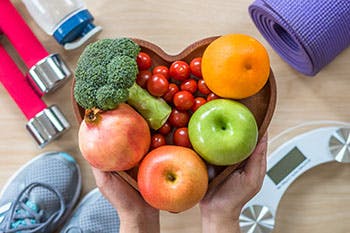UNIVERSITY NEWS LAST UPDATED : 11 MAY 2020

An academic has given his top tips to people observing Ramadan during lockdown, including swapping samosas for baked foods, avoiding salt and making sure you take your lunchbreak.
This comes as Muslims across the world observe Ramadan on lockdown due to the COVID-19 pandemic.
In his Ramadan on lockdown survival guide, Birmingham City University Assistant Lecturer and PhD researcher Ayazullah Safi, shares his advice on how to eat well and exercise whilst fasting and following lockdown rules.
To overcome some of the challenges people may face observing Ramadan on lockdown, Safi recommended:
- Whether working from home or still travelling to work, avoid skipping lunch breaks. Instead, use them for fresh air or a prayer break.
- Swap deep fried foods such as samosas for healthier options like baked foods - aim for a good balance of starchy carbohydrates such as potatoes, rice and bread, along with vegetables, proteins and dairy for natural fats.
- Drink lots of water – try to drink a minimum of two litres of water during night-time hours.
- Complete 10 to 15 minutes of low-intensity exercise such as walking, yoga or stretching each day.
- Avoid salt and caffeine - both can leave you feeling thirsty during the day and dehydrated.
Safi explained:
“Walking is the easiest form of exercise to fit into your day because we do it all the time. You can increase the benefits of walking by trying brisk or ‘power walking’, which requires all of your muscles to dynamically move and helps to achieve optimal fitness.
“The speed of power walking usually starts around 3mph and can increase to around 5mph. By swinging your arms and legs in opposition to each other, you can move forward more quickly.
“Whether you’re working from home or still going to your workplace, plan what you’re going to eat in Suhur and Iftari. Some people skip the Suhur meal to keep up with sleep, but you will need the energy from this meal to get you through the day.
“One of the common mistakes people make during Ramadan is skipping their lunch break. Make your lunch breaks productive, go out for a walk and get some fresh air, take prayer breaks, or a nap.
“Throughout fasting, we tend to crave things that may not be healthy or necessary, so it’s crucial that we consume the right nutrients to maintain good health.
“Making small changes to your diet during Iftari - the opening of the fast meal - and Suhur - the pre-dawn meal - throughout the month is also vital. There are nutrients that need to be embedded into meals to keep you full, hydrated and to boost the immune system, which is critical at this time.”
Read the full guide here.
Find out more about health sciences at Birmingham City University.